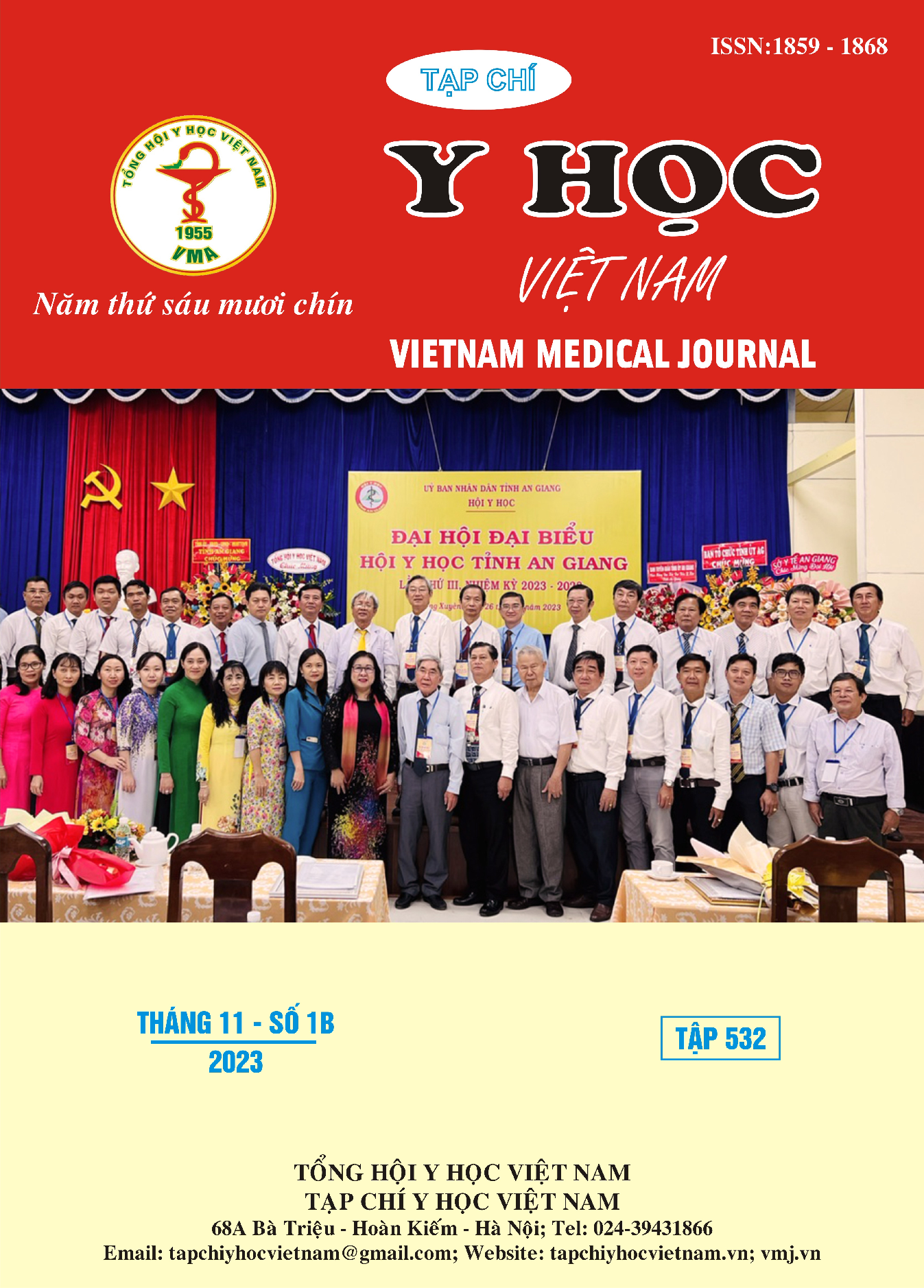RESPONSE TO FIRST-LINE TKIS TREATMENT FOR NON-SMALL CELL LUNG CANCER IN SUBGROUPS OF EGFR MUTATION AT HUU NGHI HOSPITAL
Main Article Content
Abstract
Objectives: - Clinical and complementary characteristics of advanced or metastasis Non-small cell lung cancer. - Response, PFS, OS of first-line treatment TIKs on each subtype of mutated EGFR Non-small cell lung cancer patients. Patients and Methods: Retrospective descriptive method, 45 mutated EGFR Non-small cell lung cancer patients, stage IIIb or IV get first-line treatment with TKIs (Erlotinib or Gefitinib) at Huu Nghi hospital from 6/2015 to 9/2022. Progression-free survival time is calculated from the time of drug treatment to the time of stopping treatment or to the time of stopping follow-up (September 2022). Results: Results: EGFR mutations were recorded: L858R: 19 cases (42.2%); 19DEL: 12 cases (26.7%); L747: 3 cases (6.7%); E746: 6 cases (13.3%); other 5 cases (11.1%). ORR on the main lesion and disease control rate of the two main common mutations: L858R is 42.1% and 84.21% and 19DEL is 41.67% and 75%. %. Median progression-free survival was 18.5 months in all patients, and median PFS of large mutation groups including L858R and 19DEL were 12.97 months and 12.63 months. Conclusion: The most common mutation groups are L858R on exon 21 and 19DEL on exon 19 have good results when using TKIs. Other groups of mutations need to expand the data to have a more reliable assessment.
Article Details
Keywords
TKIs, Erlotinib, Gefitinib, Advanced lung cancer, metastasis.
References
2. Castellanos E, Feld E, Horn L. Driven by Mutations: The Predictive Value of Mutation Subtype in EGFR-Mutated Non-Small Cell Lung Cancer. J Thorac Oncol Off Publ Int Assoc Study Lung Cancer. 2017; 12(4):612-623. doi: 10.1016/ j.jtho.2016.12.014
3. Chen Y, Xu J, Zhang L, et al. A multicenter-retrospective study of non-small-cell lung carcinoma harboring uncommon epidermal growth factor receptor (EGFR) mutations: different subtypes of EGFR exon 19 deletion-insertions exhibit the clinical characteristics and prognosis of non-small cell lung carcinoma. Transl Lung Cancer Res. 2022;11(2):238-249. doi:10.21037/tlcr-22-48
4. Li K, Yang M, Liang N, Li S. Determining EGFR-TKI sensitivity of G719X and other uncommon EGFR mutations in non-small cell lung cancer: Perplexity and solution. Oncol Rep. 2017;37(3): 1347-1358. doi:10.3892/or.2017.5409
5. Lim SH, Lee JY, Sun JM, Ahn JS, Park K, Ahn MJ. Comparison of clinical outcomes following gefitinib and erlotinib treatment in non-small-cell lung cancer patients harboring an epidermal growth factor receptor mutation in either exon 19 or 21. J Thorac Oncol Off Publ Int Assoc Study Lung Cancer. 2014; 9(4): 506-511. doi: 10.1097/ JTO.0000000000000095
6. Phạm Mai Thuỷ Tiên, Phạm Như Hiệp, Phan Cảnh Duy, Nguyễn Thanh Ái, Phan Thị Đỗ Quyên, Nguyễn Thị Diệu My. Đánh giá kết quả điều trị bước một ung thư phổi không tế bào nhỏ giai đoạn tiến xa, di căn có đột biến EGRF bằng thuốc ức chế Tyrosine Kinase (TKIs). Tap Chi Hoc Lam Sang. 2018;50:60-67.
7. Porta R, Sánchez-Torres JM, Paz-Ares L, et al. Brain metastases from lung cancer responding to erlotinib: the importance of EGFR mutation. Eur Respir J. 2011; 37(3): 624-631. doi: 10.1183/ 09031936.00195609
8. Sung H, Ferlay J, Siegel RL, et al. Global Cancer Statistics 2020: GLOBOCAN Estimates of Incidence and Mortality Worldwide for 36 Cancers in 185 Countries. CA Cancer J Clin. 2021;71(3): 209-249. doi:10.3322/caac.21660


